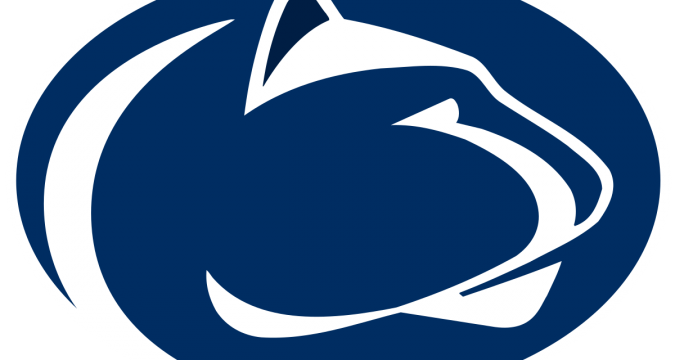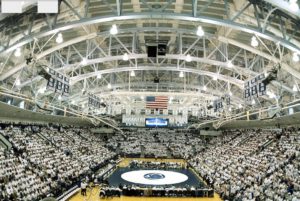
Courtesy of John Harrison
Clyde was a three-time EIWA champion, a two-time EIWA Outstanding Wrestler, a team captain and an NCAA All-American (finishing in third place in his sophomore year). He compiled a record of 49-7-2 during his Penn State career, including a 27-2-2 mark in dual meet competition. Since college he has been a very successful physical therapist and entrepreneur.
Clyde was one of the top wrestlers that I ever have had the privilege to be associated with during the twenty-some years that I was a coach at Penn State. As far as total toughness, outstanding technique, intensity, explosion and quickness, Clyde had the total package; he ranks in the top three wrestlers–that I’ve ever coached–who had all these qualities in high abundance. He also was a real student of the sport–he loved to take things apart and understand why they worked. He was a very hard worker and was probably as strong, pound for pound, as anybody we’ve ever had here because he knew how to use his strength. When he hit you with a technique, he’d explode on you and it made him feel three times as strong as he was. When he wrestled, freshmen were not allowed to wrestle varsity and in his first (sophomore) year of varsity competition he won the EIWA tournament, was named the EIWA’s tournament Outstanding Wrestler and then finished third in the NCAA tournament. After that, people started backing away from him–they didn’t want to mix it up with him and often stalled during their matches with him to keep the score close. This frustrated him–he was a perfectionist and felt that when a wrestler set foot on a mat he should be out there to do his best. He was a great athlete.
-former PSU head coach, Rich Lorenzo
Clyde, what have you been doing since you graduated from PSU?
After graduating from PSU in the spring of 1971, I married Barbara Shedd (’71) and went to Temple for a degree in Physical Therapy (’74). I worked at Temple University Hospital for a year, then went to work for a private practice physical therapy company out of Texas. I opened five of their hospital contracted physical therapy departments around the country (TX, PA, NC, TN, NM) over the next year before settling in Albuquerque, New Mexico. I worked for this company until 1980, when I started my own physical therapy company (New Mexico Physical Therapists, Inc). I aggressively grew this company (65 employees at one point) over the next eleven years and in 1991 sold it to NovaCare. After a three-year earnout, I retired, and we returned to PA in mid-1995 to assist Barbara’s father, who lives in Lancaster County. Barbara and I were fortunate to have a little boy (Will) in 1989, and we acquired a black lab (Betsy) in 1995, so playing with my family has been my primary occupation/avocation since coming back to PA. This past November, I awoke to the fact that it had been some time (four years) since I last functioned as a physical therapist. I subsequently began doing some fill-in work for companies to diminish the rust and maintain my licenses.
How did you get started in wrestling?
My father liked wrestling, though he never wrestled. I think I was 10 to 12 when he started taking me to a few high school matches. Hughesville (PA) High School had a pretty good wrestling team for a small school (a few state champs), and by junior high I had decided that I wanted to try wrestling. My father didn’t object, but felt he needed me to be at home to milk cows after school. Consequently, I made it to less than a dozen practices in both 7th and 8th grade, and we only had a few exhibition matches prior to the varsity/junior varsity matches. My understanding with my Dad was that if I wanted to go out for wrestling I could, but I needed to find my own way home. It’s tough to find a ride out there in the country around 5:30 p.m. and the three plus miles to my house was a cold walk in the winter, especially after practice. As I recall, Hughesville was having a major lull in their wrestling program in 1964 (only 20 to 25 kids) when Pete Wolf became the new head coach. Though I was in ninth grade and should have wrestled 120 or 127, I couldn’t beat Keith Taylor, a 2-time State Champ (very few others beat him either) or another kid named Parsons, who I believe was a District 4 Champ. Consequently, I made the team at 133 and basically got pummeled the whole season. Fortunately, I went to a Russ Houck Wrestling Camp that summer and Larry Fornicola (a PSU National Champion in 1955) impressed me enough to make my losing ways relatively short-lived.
What are your best memories from the years you spent as a PSU wrestler?
My best memories of wrestling at PSU are of having really great teams. In my junior and senior years, we were undefeated (11-0 in 1970 and 10-0 in 1971), and a whole bunch of us won the Easterns. We had pin pools and I remember Matter and me frequently rooting for Joyner’s opponent not to get pinned until after our respective pin times. We all needed the money!!
How has the PSU wrestling experience impacted your life/career?
I don’t know that PSU wrestling was as much an influence on my life as the sport of wrestling itself. I have come to believe that “when push comes to shove” and opponents are near equal, the “toughest” individual wins. I feel toughness is a function of individuals being able to focus their will/desire on a goal they deem important, and persevere until it is achieved. Therefore, I feel wrestling has caused me to believe that strong will, focus of this will/desire, and perseverance are the essential ingredients to success. Those who are able to effectively maintain these qualities under stress become champions. An individual can have all “the skills,” but without strong will, the ability to focus it, and willingness to persevere, he/she will fail.
Do you still follow wrestling?
Having moved from PA so many years ago, I really haven’t been involved with or able to follow wrestling for twenty-five years. New Mexico has wrestling, but not at the level of Pennsylvania’s, and my total work commitment (initially seven days/week, 24-hour on-call) left little time.
How has wrestling changed since you were a collegiate wrestler?
I have seen a couple of PSU matches since returning to PA, and it seems to me that there have been some changes which make collegiate more compatible with freestyle, but I couldn’t really elaborate on the specifics.
What advice do you have for collegiate wrestlers today?
Get a good education; it creates value in yourself. If at all possible, work for yourself (as an entrepreneur) and/or position yourself so that you have some control over what you are able to achieve.
Thanks Clyde!

